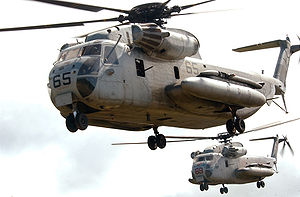
The CH-53 Sea Stallion is the most common name for the Sikorsky S-65 family of heavy-lift transport helicopters. Originally developed for use by the United States Marine Corps, it is in service with Germany, Iran, Israel, and Mexico. The United States Air Force operated the HH-53 "Super Jolly Green Giant" during the late– and post–Vietnam-War era, updating most of them as the MH-53 Pave Low.
The dimensionally-similar CH-53E Super Stallion is a heavier-lifting, improved version designated S-80E by Sikorsky. Its third engine makes it more powerful than the Sea Stallion, which it has replaced in the heavy-lift mission.
In 1960, the United States Marine Corps began to seek a replacement for their HR2S piston-powered helicopters. On 27 January 1961, the Marine Corps began working with the other three U.S. armed services on the "Tri-Service VTOL transport", which would eventually emerge as the Vought-Hiller-Ryan XC-142A tiltwing. The design became more elaborate and the program stretched out, causing the Marines to drop out when they decided they would not receive a working machine in a satisfactory timeframe. In the end, the XC-142A, although a very innovative and capable machine, never entered production.